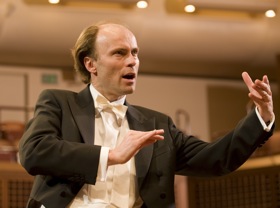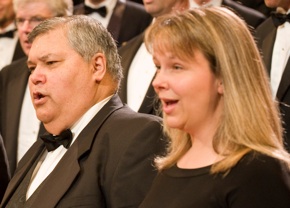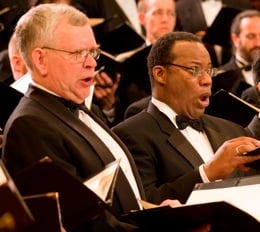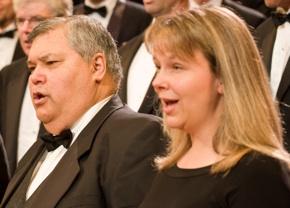
Related Articles
Singing With Vision
Interview with Ragnar Bohlin
Visions and Non Thoughts
CD Review: Swedish Radio Choir under the direction of Ragnar Bohlin
San Francisco Symphony Chorus Director Ragnar Bohlin arrived from Sweden only four years ago, and he has already brought the organization to new heights. The triple-crown concert last month — of the Mozart Requiem, Urbaitis' Lacrimosa, and Feldman's Rothko Chapel — was just the most recent example of affecting excellence.
This week, Bohlin and the Chorus are meeting their ultimate challenge in performing Bach's B minor Mass, a towering landmark of all music.
The result is a delightful surprise, the opposite of big or grandiose, a B minor Mass different from almost all the many in my experience. Using minimal forces, Bohlin presides over an intimate, gentle, and lyrical performance of this majestic expression of yearning for peace and the good of all humanity.
On the quietly soaring voices of the sopranos, the opening of Kyrie came seemingly from nowhere, the work's mighty engine starting up from the threshold of sound — no intake of breath, nothing extraneous: from silence to music, seamlessly.
The wondrous layers of the Kyrie were tightly but effortlessly woven, the small, select orchestra cradling the Chorus here, and throughout. The innate, inward, self-effacing spirit of the performance permeated all, to the very end, to the fervent prayer of Dona nobis pacem in the Agnus Dei.
(It's a puzzle why Scott Foglesong's otherwise excellent program notes question Bach's reasons for repeating the music of the Gloria at the end. What reasons do you need for perfection?)

In addition to Bohlin and the Chorus, it was the instrumentalists who made the evening a triumph, both as an ensemble and in the many prominent obbligato when instruments and voices fused into one.
Joining soprano Ingela Bohlin, mezzos Abigail Nims and Kelley O'Connor, tenor Nicholas Phan, and bass-baritone Shenyang (the Cardiff Singer of the World winner in his local debut) were concertmaster Nadya Tichman's violin singing with burnished beauty in Laudamus Te, flutist Tim Day's virtuoso in Benedictus, Day and Michelle Caimotto in Domine Deus. Horn player Bob Ward played the solo for Quoniam, and bassoonists Steve Paulson and Steve Braunstein joined in the obbligato.
Oboists Jonathan Fischer and Russ deLuna played the oboe d'amore obbligato for Et in Spiritum Sanctum; Fischer played the solo for Qui sedes. Besides the strings and the entire woodwind section, the brass was extraordinary, led by Mark Inouye's trumpet, along with Michael Tiscione and Jeff Biancalana. David Herbert's timpani and Jonathan Dimmock's organ completed the orchestra.

Choral balances and dynamics were superb, with only a couple of errors in individual entrances. One of Bohlin's greatest strengths is in the invariable excellence of cutoffs. Not the aggressive, dramatic stops some other conductors favor, Bohlin's are more like releases, the music ends cleanly, "effortlessly" (in quotes, considering the amount of work and rehearsals that go into that).
With everything simple and understated, the few big forte passages of the Mass were all the more effective; especially the triumphant, joyful sound greeting the Resurrection, and the delight in the Hosanna.
Being "undramatic" had a single downside, perhaps only something subjective. The crucial point in the Mass is the shift from the ghostly end of the Cruxifixus, the silence following the death on the Cross, and the following D Major explosion of the Resurrection, taking away "death's sting."
The right pause between the two clashing elements of death and hope is impossible to measure in seconds or by the score: it has to be intrinsically, spiritually right. On Wednesday, I felt the silence was not complete enough, not expressing despair, but rather being impatient in preparing for the notes to follow. Instead of a hush, it was a pause.
Or perhaps just something to complain about because everything else was so right.

